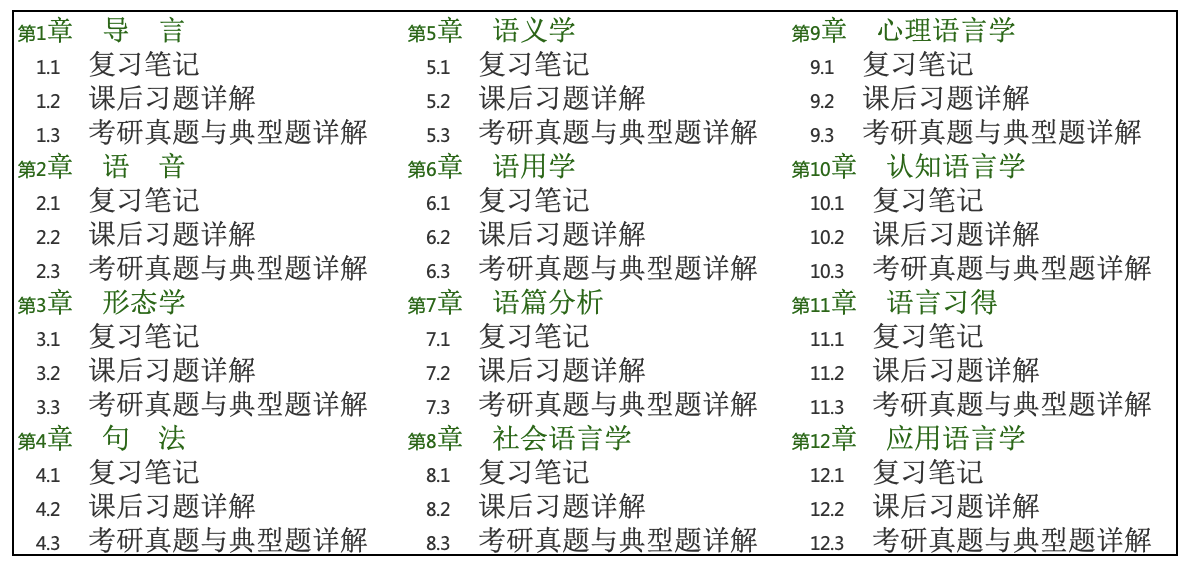刘润清《新编语言学教程》笔记和课后习题(含考研真题)详解 【完整内容点击文中链接获取】
第1章 导 言
本章要点:
1. The definition and main branches of linguistics study
语言学的定义和研究的范围
2. The definition and the origins of language
语言的定义与起源
3. The design feature and the function of language
语言的特征和功能
4. Some major concepts in linguistics
语言学中重要的概念
本章考点:
1. 有关语言学的常考考点
(1) 语言学的定义,现代语言学与传统语法学研究的区别。
(2) 语言学中几组重要概念,每组两个概念的含义、区分及其意义。
(3) 普通语言学的主要分支学科及各自的研究范畴。
(4) 宏观语言学及应用语言学的主要分支及各自的研究范畴。
2. 有关语言的常考考点
(1) 语言的定义;语言的基本特征(任意性、二重性、多产性、移位性、互换性、专门性和文化传递性);
(2) 语言的功能(寒暄、指示、信息、疑问、表达、劝说和施为);
(3) 语言的起源(叮咚说、唱歌说、哒哒说、汪汪、噗噗、哟嘿吼理论等。)
I. Definition of linguistics (语言学的定义)
【考点:名词解释】
The scientific or systemic study of language, which is always guided by the- three canons of science: exhaustiveness, consistency and economy.
语言学是对语言的科学或系统的研究。语言学研究的科学性可以归纳为:穷尽性、一致性以及简洁性。
II. Linguistics vs. traditional grammar (语言学与传统语法)
Linguistics differs from traditional grammar at least in three basic ways.
1. Linguistics describes languages and does not lay down rules of correctness.
2. Linguists regard the spoken language as primary, not the written.
3. Linguistics describes each language on its own merits.
语言学在以下三方面不同于传统语法。
1. 语言学描述语言而非设定规则。
2. 语言学认为口语是基础而非文字。
3. 语言学描述不同的语言,而非一概而论。
III. Scope of linguistics (语言学的研究范畴)
1. Microlinguistics(微观语言学)
Phonetics语音学
Phonology音系学
Morphology形态学
Syntax句法学
Semantics语义学
Pragmatics语用学
2. Macrolinguistics (宏观语言学)
Sociolinguistics社会语言学
Psycholinguistics心理语言学
Neurolinguistics神经语言学
Stylistics文体学
Discourse analysis语篇分析
Computational linguistics计算语言学
Cognitive linguistics认知语言学
Applied linguistics应用语言学
IV. Definition of language (语言的定义)
【考点:名词解释】
1. Language is a system—elements in it are not arranged and combined randomly, but according to some rules and principles.
2. Language is arbitrary—there is no intrinsic connection between the word (e.g. pen) and the thing (e.g. what we write with).
3. Language is vocal—the primary medium for all languages is sound.
4. Language is used for human communication—it is human-specific, very different from systems of animal communication.
1. 语言是一个系统——其元素非任意排列,而是根据一定规则组合的。
2. 语言是任意的——词与其所指物之间没有内在的联系。
3. 语言是口头的——是所有语言的基本交流形式。
完整内容进入资料查看……

【完整版】 达聪网 刘润清《新编语言学教程》笔记和课后习题(含考研真题)详解
热门内容






